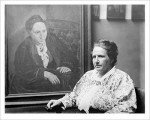Chronicles of Chronos: Ian Reid
One of the many weird features of old age is that you occasionally (or often) wake up at 4:30 or 5 in the morning (sometimes just because the dreams have gotten too idiotic), and all the things, both particular and general, that add up to your “life,” wash over you in an ungentle wave from the Ocean of Chronos itself. A few drops of the last of the nighttime rain are sporadically plinking on the windowsill outside. By “old age,” I mean that advanced stage when people stop saying to you, “Oh, come on, you’re not old… That [e.g., 65, 70, 80] isn’t old. ” I guess their no longer saying it is, like many things, a “mixed blessing.”
Wake clear-headed (that’s good) after 6 or so uninterrupted (for a change) hours of sleep. I.e., the “break” of no-pee-breaks. Wake with the undertow of grief from the Ocean of Chronos. Yesterday, or the day before, I learned that an old acquaintance I haven’t seen for 20 or more years, Ian Reid, died on the weekend, at age 58, after more than a decade of living with spinal cancer. The image of his face is there, surprisingly clear, under the time-wave. Hadn’t seen him for a long time, but he had taken the trouble to “friend” me on Facebook a couple of years ago, and through that I’d read some entries/essays on his blog about the experience of cancer, the kind of powerful writing that makes you sort of gag in empathy.
But I remember Ian as the young, super-energetic, engaged, unembittered (“unembittered” is important), social democratic political activist (early 1980s?), and as I’m fumbling to get the chronology sorted out (I never do these days), I’m looking at an FB memorial note from a political communications firm he was associated with that includes a big smiling pic of Ian and another man, Paul, who turns out to be his spouse. Gee, I never knew Ian was married to a same-sex partner. But I’m so dim about these things. Ian, when we hung out at political meetings together, was a young hetero married father of… how many children? (Nope, don’t even know the basics.) Gee, where was my gaydar when I could have used it? Then I check the online newspaper of record to see if there’s an obituary… well, to see if it’s really true, I suppose. Can’t find it. I guess the notion of “newspaper of record” is over.
The main thing I object to, in advance, about not being there, is that people can say things about you that you can’t reply to. Utterances that your living presence, the very possibility of your talking-back, would have made them think twice about before opening their big yaps. I object to being out of the game. (And the game, poet George Stanley reminds me, is worth the candle.)
I’m puzzled, but I can’t figure out the solution to the puzzle, by how quickly the dead become irrelevant to us, or what I should do about it. Yeah, sure, they “live” in our memories. Thanks. There is no R.I.P., that’s just a fantasy of the living, there’s just “not here.” The novelist Jose Saramago said (I think), the only difference between life and death is that now you’re here and then you won’t be.
The other week I was reading Christopher Hitchens’ last book of essays, Arguably — Hitchens died at the end of 2011, at age 61, of esophageal cancer — and thinking, to myself, Ah, he died at least a decade too early; it would be nice to have Hitchens around still poking at stuff in his pugnacious, eloquent way. Then I realize that I think a lot of people have died a bit too early for my liking. Socrates, about 2400 years too early. No, the looney-tune, homophobic (“God hates fags” was his slogan), fundamentalist preacher who kicked the bucket a couple of weeks ago didn’t die too early. Don’t worry, I’m not becoming completely mushy-headed.
But it’s not only in memoriam that’s on my mind, it’s in media res as well. Even as I’m waking, making the first moves of the pre-morning, I know I have to check whether Ukraine in eastern Europe is still more or less in one piece on this stormy but spring-like dawn. It may have simply drowned in the tsunami of Russian propaganda that my Facebook “friends” incessantly keep posting on my “news feed” (i.e., did I really need to re-read the statement of the Russian foreign minister that I already read in the Guardian newspaper?) — no, wait, sticks and stones and 40,000 Russian troops on the border of eastern Ukraine can break our bones, but ultra-leftist propaganda can merely annoy us.
And simultaneously, there are a half dozen other things on my mind: a virtual conversation or “thread” about universities that I’ve been taking part in; the book about adolescent boys in love in Venice written by a more or less forgotten author 20 years ago that I’m reading, Harold Brodkey’s Profane Friendship (1994), on the shaky ground that I’m planning to spend a couple of days in Venice at the end of the month; a note by the philosopher Alain Badiou about the Middle Ages (it’s on FB, that much diminished simulacrum of a public forum to which we’ve been reduced) (who you end up with in your individualized Facebook network is the new definition of karma!), which I ought to respond to, just because I think M. Badiou, in this instance, is wrong. I better see if the friend to whom I wished good luck (he’s starting a new job today) got my note… and and and. It’s all there, all the time. The little Cable News Network of the soul.
Each of those things can be written about, and some will be. At a certain arbitrary moment — it’s close to 9 in the morning — I decide, that’s as far as I’ll go, for now.
.
Berlin, Wed., 9:00 a.m., April 9, 2014.



